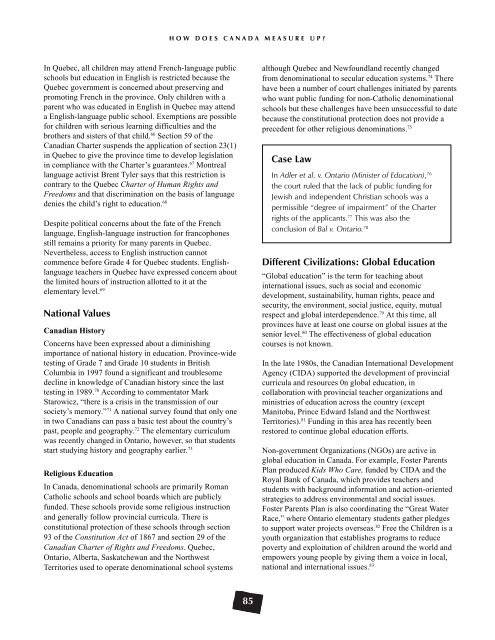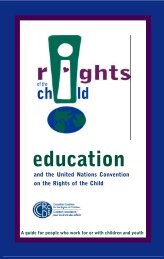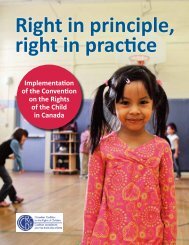Poste - Canadian Coalition for the Rights of Children
Poste - Canadian Coalition for the Rights of Children
Poste - Canadian Coalition for the Rights of Children
You also want an ePaper? Increase the reach of your titles
YUMPU automatically turns print PDFs into web optimized ePapers that Google loves.
In Quebec, all children may attend French-language public<br />
schools but education in English is restricted because <strong>the</strong><br />
Quebec government is concerned about preserving and<br />
promoting French in <strong>the</strong> province. Only children with a<br />
parent who was educated in English in Quebec may attend<br />
a English-language public school. Exemptions are possible<br />
<strong>for</strong> children with serious learning difficulties and <strong>the</strong><br />
bro<strong>the</strong>rs and sisters <strong>of</strong> that child. 66 Section 59 <strong>of</strong> <strong>the</strong><br />
<strong>Canadian</strong> Charter suspends <strong>the</strong> application <strong>of</strong> section 23(1)<br />
in Quebec to give <strong>the</strong> province time to develop legislation<br />
in compliance with <strong>the</strong> Charter’s guarantees. 67 Montreal<br />
language activist Brent Tyler says that this restriction is<br />
contrary to <strong>the</strong> Quebec Charter <strong>of</strong> Human <strong>Rights</strong> and<br />
Freedoms and that discrimination on <strong>the</strong> basis <strong>of</strong> language<br />
denies <strong>the</strong> child’s right to education. 68<br />
Despite political concerns about <strong>the</strong> fate <strong>of</strong> <strong>the</strong> French<br />
language, English-language instruction <strong>for</strong> francophones<br />
still remains a priority <strong>for</strong> many parents in Quebec.<br />
Never<strong>the</strong>less, access to English instruction cannot<br />
commence be<strong>for</strong>e Grade 4 <strong>for</strong> Quebec students. Englishlanguage<br />
teachers in Quebec have expressed concern about<br />
<strong>the</strong> limited hours <strong>of</strong> instruction allotted to it at <strong>the</strong><br />
elementary level. 69<br />
National Values<br />
<strong>Canadian</strong> History<br />
Concerns have been expressed about a diminishing<br />
importance <strong>of</strong> national history in education. Province-wide<br />
testing <strong>of</strong> Grade 7 and Grade 10 students in British<br />
Columbia in 1997 found a significant and troublesome<br />
decline in knowledge <strong>of</strong> <strong>Canadian</strong> history since <strong>the</strong> last<br />
testing in 1989. 70 According to commentator Mark<br />
Starowicz, “<strong>the</strong>re is a crisis in <strong>the</strong> transmission <strong>of</strong> our<br />
society’s memory.” 71 A national survey found that only one<br />
in two <strong>Canadian</strong>s can pass a basic test about <strong>the</strong> country’s<br />
past, people and geography. 72 The elementary curriculum<br />
was recently changed in Ontario, however, so that students<br />
start studying history and geography earlier. 73<br />
Religious Education<br />
In Canada, denominational schools are primarily Roman<br />
Catholic schools and school boards which are publicly<br />
funded. These schools provide some religious instruction<br />
and generally follow provincial curricula. There is<br />
constitutional protection <strong>of</strong> <strong>the</strong>se schools through section<br />
93 <strong>of</strong> <strong>the</strong> Constitution Act <strong>of</strong> 1867 and section 29 <strong>of</strong> <strong>the</strong><br />
<strong>Canadian</strong> Charter <strong>of</strong> <strong>Rights</strong> and Freedoms. Quebec,<br />
Ontario, Alberta, Saskatchewan and <strong>the</strong> Northwest<br />
Territories used to operate denominational school systems<br />
H O W D O E S C A N A D A M E A S U R E U P ?<br />
85<br />
although Quebec and Newfoundland recently changed<br />
from denominational to secular education systems. 74 There<br />
have been a number <strong>of</strong> court challenges initiated by parents<br />
who want public funding <strong>for</strong> non-Catholic denominational<br />
schools but <strong>the</strong>se challenges have been unsuccessful to date<br />
because <strong>the</strong> constitutional protection does not provide a<br />
precedent <strong>for</strong> o<strong>the</strong>r religious denominations. 75<br />
Case Law<br />
In Adler et al. v. Ontario (Minister <strong>of</strong> Education), 76<br />
<strong>the</strong> court ruled that <strong>the</strong> lack <strong>of</strong> public funding <strong>for</strong><br />
Jewish and independent Christian schools was a<br />
permissible “degree <strong>of</strong> impairment” <strong>of</strong> <strong>the</strong> Charter<br />
rights <strong>of</strong> <strong>the</strong> applicants. 77 This was also <strong>the</strong><br />
conclusion <strong>of</strong> Bal v. Ontario. 78<br />
Different Civilizations: Global Education<br />
“Global education” is <strong>the</strong> term <strong>for</strong> teaching about<br />
international issues, such as social and economic<br />
development, sustainability, human rights, peace and<br />
security, <strong>the</strong> environment, social justice, equity, mutual<br />
respect and global interdependence. 79 At this time, all<br />
provinces have at least one course on global issues at <strong>the</strong><br />
senior level. 80 The effectiveness <strong>of</strong> global education<br />
courses is not known.<br />
In <strong>the</strong> late 1980s, <strong>the</strong> <strong>Canadian</strong> International Development<br />
Agency (CIDA) supported <strong>the</strong> development <strong>of</strong> provincial<br />
curricula and resources 0n global education, in<br />
collaboration with provincial teacher organizations and<br />
ministries <strong>of</strong> education across <strong>the</strong> country (except<br />
Manitoba, Prince Edward Island and <strong>the</strong> Northwest<br />
Territories). 81 Funding in this area has recently been<br />
restored to continue global education ef<strong>for</strong>ts.<br />
Non-government Organizations (NGOs) are active in<br />
global education in Canada. For example, Foster Parents<br />
Plan produced Kids Who Care, funded by CIDA and <strong>the</strong><br />
Royal Bank <strong>of</strong> Canada, which provides teachers and<br />
students with background in<strong>for</strong>mation and action-oriented<br />
strategies to address environmental and social issues.<br />
Foster Parents Plan is also coordinating <strong>the</strong> “Great Water<br />
Race,” where Ontario elementary students ga<strong>the</strong>r pledges<br />
to support water projects overseas. 82 Free <strong>the</strong> <strong>Children</strong> is a<br />
youth organization that establishes programs to reduce<br />
poverty and exploitation <strong>of</strong> children around <strong>the</strong> world and<br />
empowers young people by giving <strong>the</strong>m a voice in local,<br />
national and international issues. 83




